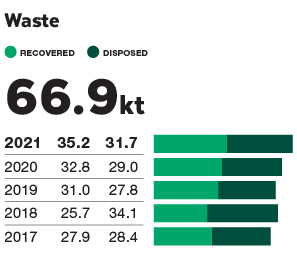Bunnings - Waste and packaging
 Reducing operational waste, minimising packaging and providing product recycling solutions for customers remain key to Bunnings’ efforts to reduce waste and packaging across the network.
Reducing operational waste, minimising packaging and providing product recycling solutions for customers remain key to Bunnings’ efforts to reduce waste and packaging across the network.
During the year, Bunnings focused on identifying opportunities for reduction and substitution of packaging across its product range. To help achieve this, an online portal was developed to capture baseline packaging data for Bunnings’ directly sourced products. In the coming financial year, the portal will be expanded to incorporate additional suppliers to Bunnings.
As a signatory to the Australian Packaging Covenant Organisation (APCO), Bunnings is committed to its target of 100 per cent sustainable packaging by 2025. During the financial year, Bunnings continued to work with suppliers to understand requirements to transition to sustainable packaging by 2025 and incorporated APCO’s Sustainable Packaging Guidelines into its packaging guidelines and range review process.
Bunnings also continued to include the Australasian Recycling Label (ARL) on packs to help customers better understand packaging recycling, with over 500 products now displaying ARL information. Bunnings will continue to work with suppliers to implement the ARL to additional products in the coming years.
Reducing operational waste is an important opportunity for Bunnings. To accelerate waste diversion, Bunnings undertook targeted waste audits in key stores across the Australian network, with the aim of providing an assessment of the current waste being generated, recovered and sent to landfill. The audits will help inform waste reduction actions for the business in the coming financial year.
Bunnings continued to work with social enterprises, businesses and not-for-profit organisations to provide recycling programs for batteries, electrical items, waste paint and packaging.
During the year, over 7,500 kilograms of batteries were collected from customers through 13 metropolitan Melbourne stores and over 1,500,000 kilograms of e-waste was collected from customers through Bunnings’ South Australian network. The e-waste collected includes power tools, fans and heaters and is recycled through Minda’s Unplug N’ Drop Program. With Bunnings’ support, ongoing employment is provided through this program for 50 people with a disability.
Paint recycling events were reintroduced at Bunnings stores later in the year as COVID-19 restrictions eased. As a result, seven Paintback events were hosted at Bunnings stores, collecting over 40,000 kilograms of waste paint and packaging.
In the coming financial year, Bunnings will heighten its focus on waste reduction across the business through improved reporting and management of waste streams and increased diversion from landfill. There will also be a continued effort to collect product packaging data to aid the reduction and transition of primary, secondary and tertiary packaging across the Bunnings product range.